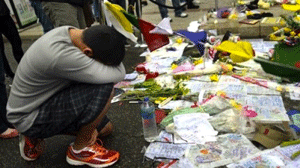It has been nearly two weeks since the Boston Marathon bombings, yet no amount of time that will pass can alleviate the remaining shock of having, once again, become targets in our own backyards. This time, the attack took place during one of our country’s most cherished annual traditions. The first thoughts that Muslim and Arab Americans had were those of horror, fear and grief for the loss of innocent life. The second thought: “Please don’t let the perpetrators be Muslim.”
The Boston Marathon is the world’s oldest annual marathon, and ranks as one of the world’s best-known road racing events. This year, approximately 26,839 people registered for the event that also attracted 500,000 spectators, making it an ideal target for brothers Tamerlan and Dzhokhar Tsarnaev to commit their heinous attack before a worldwide audience. On April 15, 2013 at 2:50 PM EDT, as the race was winding to a close, two explosions occurred. The race was halted, preventing many from finishing. Three spectators were killed and more than 260 people were injured.

Three days later, the two prime suspects were identified, and a national manhunt ensued. Our second greatest fear, after being attacked, was realized. The suspects were, in fact, Muslim. Almost immediately thereafter identification, and in some cases even before, the [now expected] public statements from Arab and Muslim American community organizations began to roll out; one after the other, condemning the attacks; Statements that, under any other circumstances, would not need to be made so vigilantly. Of course we condemn the attacks! Of course we stand in solidarity! We are Americans as well. We are also victims. Those of us who did participate in the marathon, or attended, as spectators, were also targets of these indiscriminate criminals. Yet, we somehow felt the need to set ourselves apart, once again.
As Americans, whether born here, or naturalized, our solidarity with our country of birth, or choice, continues to be questioned, and we have allowed ourselves some responsibility in this matter. As a community, we insist on equality and fair treatment. We continue to advocate that we are just as “American” as anyone else. Yet in every instance, we have managed to reinforce those lines of separation. We have become responsible for this self-fulfilling prophecy of guilt by association, thus creating an expectation that we ought to remain apologetic for these acts of terror that we are also victims of. Our distorted thought process contradicts the very essence of the American values that we take pride in and cherish.
We are quick to denounce, to reprimand, to condemn, as if we are the parents of some unruly children, whose actions we must apologize for. The fact of the matter is that these individuals bare no relation to us. They are not of us. They do not share our beliefs, our ideology, or our character, and they certainly do not represent it. They do not speak on behalf of us. Therefore, we don’t need to speak above them and pander to an already cynical and skeptical society and media. This skewed need to “disassociate” has caused us to inversely further associate ourselves with these individuals.
In 2001, shortly after the 9/11 attacks, during my tenure at an Arab American civil rights organization, I was asked by a New York Times reporter whether, or not the American flag hanging in my office had always been there, or whether I had displayed it only after the attacks. As a U.S.-born citizen, who had only ever traveled outside of my home country once at that point, I was at first confused, then appalled and later offended by her question, which, in essence, was a question of my loyalty to the only country that I have ever considered home. I resented the fact that I was being asked to explain, or defend myself to someone who knew nothing about me, or my community. Sadly, over the last 12 years, we have grown accustomed to “explaining” ourselves. It has become second nature to us. If we are to be responsible for anything, it is for the image that we have created of ourselves, as a separatist, apologetic community, seeking acceptance among our very own.
It is time we take a hard look at ourselves and our actions over the past decade and reassess our own failures. Only when we, as a community of Muslim and Arab Americans, can share in only the grief and horror, and not in the responsibility, can we even begin to move toward the true “freedom” and “equality” that we seek.






Leave a Reply